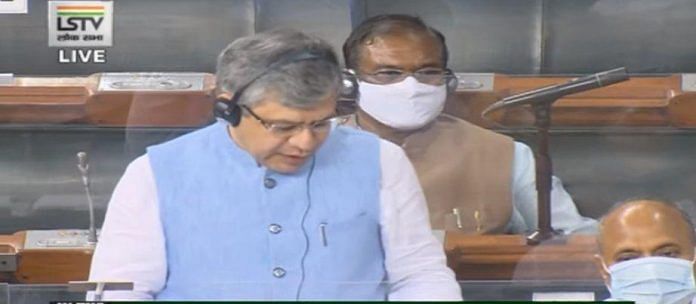New Delhi: The Narendra Modi government defended itself over allegations of spying using the Israeli software Pegasus, by calling it an “attempt to malign the Indian democracy and its well-established institutions”.
Speaking in the Lok Sabha Monday afternoon, newly-appointed Information Technology minister Ashwini Vaishnaw hit out at the news reports published Sunday night over the alleged use of Pegasus to spy on a list of journalists, ministers, and opposition leaders.
“A highly sensational story was published by a web portal last night. Many over-the-top allegations made around this story,” Vaishnaw said. “The press reports appeared a day before the monsoon session of Parliament. This can’t be a coincidence.”
“In the past, similar claims were made regarding the use of Pegasus… Those claims had no factual basis and were categorically denied by all parties,” he added.
According to the first reports published late Sunday, phones of two serving union ministers, three opposition leaders, one constitutional authority, current and former heads of security organisations, administrators, and 40 senior journalists and activists from India were allegedly bugged using Pegasus and put on surveillance.
The findings were reported by a global consortium of media organisations, including TheWire in India.
Vaishnaw also spoke of legal monitoring and interception of electronic devices, authorised according to Indian law.
“The procedure ensures that any monitoring of any information is done as per due procedure of law… The time-tested procedures are well established to ensure that unauthorised surveillance cannot occur,” he said.
Vaishnaw himself was Monday named as one of those whose numbers was potentially targeted.
Also read: What is Pegasus? The ‘ultimate spyware’ used for surveillance
‘NSO has rubbished the claims’
Amid a ruckus in the Lok Sabha by the opposition, which raised slogans demanding transparency, Vaishnaw implored all members of the house to “examine the issue on facts and logic”.
“The allegation is that individuals linked to these phone numbers were being spied upon,” Vaishnaw said. “However, the report says that the presence of a phone number in the data does not reveal whether a device was infected with Pegasus or subject to an attempted hack.”
He further said that “without subjecting a phone to this technical analysis, it is not possible to conclusively state whether it witnessed an attempted hack or was successfully compromised”.
“The report itself clarifies that presence of a number in the list does not amount to snooping,” he added.
The IT minister then went on to quote from the official statement of the NSO, the Israeli firm behind Pegasus.
“It is beyond dispute that the data has nothing to do with surveillance or with NSO, so there can be no factual basis to suggest that the use of the data somehow equates to surveillance,” Vaishnaw quoted the NSO statement.
He further quoted NSO saying that “the list of countries shown using Pegasus is incorrect, and many countries mentioned are not even our clients”.
News agency ANI had reported earlier Monday that NSO responded to its questions about the row, denying allegations of illegal snooping.
Vaishaw in Lok Sabha also said that “NSO has also totally rubbished the claims in the report”.
‘Illegal surveillance impossible with checks and balances in India’
Vaishnaw also cited “India’s established protocol when it comes to surveillance”.
“Any form of illegal surveillance is not possible with the checks and balances in our laws and robust institutions,” he said.
“In India, there is a well-established procedure through which lawful interception of electronic communication is carried out for the purpose of national security particularly on the occurrence of any public emergency.”
Vaishnaw went on to talk about how “lawful interceptions” are made according to
“relevant rules” and approved by the “competent authorities”.
Vaishnaw concluded his speech, saying that there is “no basis to the sensationalism whatsoever”.
(Edited by Arun Prashanth)
Also read: List of Indian journalists, activists allegedly put on surveillance using Pegasus



